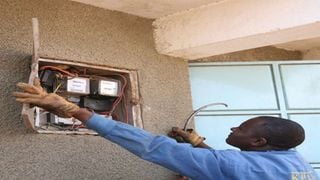
A Kenya Power and Lighting Company employee inspects a meter box.
| File | Nation Media GroupBusiness
Premium
Why taxpayers will have to pay billions for cheaper power
The expensive power purchase agreements (PPAs) signed between Kenya Power and independent producers cannot be terminated, Solicitor-General Ken Ogeto has said, dimming hopes of cheaper electricity.
He told the National Assembly’s Committee on Energy yesterday that taxpayers will have to foot billions of shillings in damages should the government wish to review or terminate the agreements.
The revelation comes just days after President Uhuru Kenyatta appointed a committee to implement recommendations made by the presidential task force on review of PPAs. It proposed the termination of some agreements to lower electricity prices by a third by December.
Mr Ogeto said only two PPAs have a termination clause. “Some PPAs cannot be terminated, or reviewed, unilaterally by Kenya Power and can only be terminated if the independent power producers fail to meet their obligations,” the Solicitor-General said.
Breach of contract
“Kenya Power’s unilateral termination will constitute a breach of contract and an act of default, entitling the IPP to claim liquidated damages equal to the total project costs less assumed depreciation.
“This is in reference to the PPAs between Kenya Power and Rabai Power Ltd, Gulf Power Ltd, Thika Power Ltd, Triumph Power Ltd, and Muhoroni Power Generating Plant,” he added.
To underline the huge cost of these one-sided agreements, the MPs heard that KenGen – which supplied 72 per cent of the electricity bought by Kenya Power in the year ending June – only received 48 per cent of its money from the distributor.
IPPs, who supplied only 26 per cent of electricity, were paid 47 per cent of the power purchase dues.
KenGen, which sold 7,548 units of electricity to the company, got Sh41.2 billion at a cost of Sh5.46 per unit.
IPPs, which sold only 2,785 units at a cost of Sh14.57 per unit, received Sh40.5 billion from the power distributor.
Sh42.86 billion
Worryingly, consumers paid Sh42.86 billion to KenGen and the IPPs for power that they never consumed through capacity charges, underlining their huge burden to the power bill.
National Treasury Principal Secretary Julius Muia, who also appeared before the committee, said the Treasury only provides a Letter of Support (LoS) to allow the IPPs get funding for the projects. This letter places the burden of payment of IPPs on the taxpayers in case of any risks.
“As a requirement for debt financing for IPPs projects, the Treasury provides a letter of support to ensure such long term projects/investments are secure and bankable as they provide certainty about the security of investments. Further, the LoSs are used to de-risk such projects and enhance the IPPs access to credit from potential lenders,” Mr Muia said.
MPs probed the Treasury on whether it considered the implications of the agreements on taxpayers before signing the LoS for the projects.
“Without the letter of support, these projects cannot go on. Did you do an analysis of the contingent liabilities of these PPAs to taxpayers before you signed the letters?” posed Bonchari MP Pavel Oimeke, who is a former Energy and Petroleum Regulatory Authority (Epra) boss.
“It is curious that these PPAs are signed on a build-operate-own model as opposed to the build-operate-transfer model that was used for the Muhuroni Power Plant that gives ownership to the government once the tenure of the PPA ends,” added Nakuru Town East MP David Gikaria, who is also the chair of the committee.
Mr Muia said Treasury does not participate in the negotiations of the PPAs and, therefore, cannot respond to why the rates charged by KenGen vary from those of IPPs.
“The Treasury does not participate in the procurement of IPPs and is not involved in the negotiation for the PPAs between Kenya Power and KenGen and IPPs. Treasury is not party to such contractual obligations,” Mr Muia said.





